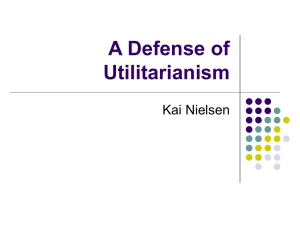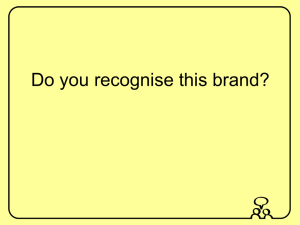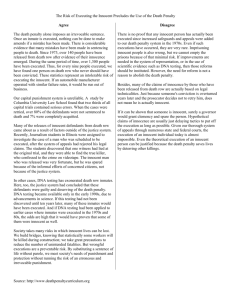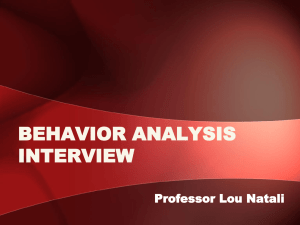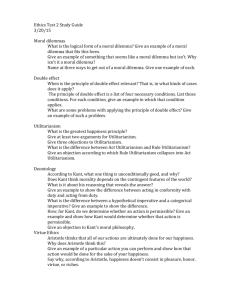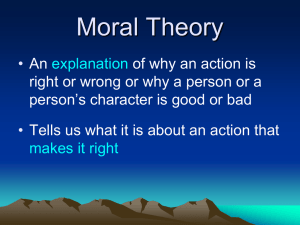Debating the Calculability of the Unacceptable
advertisement
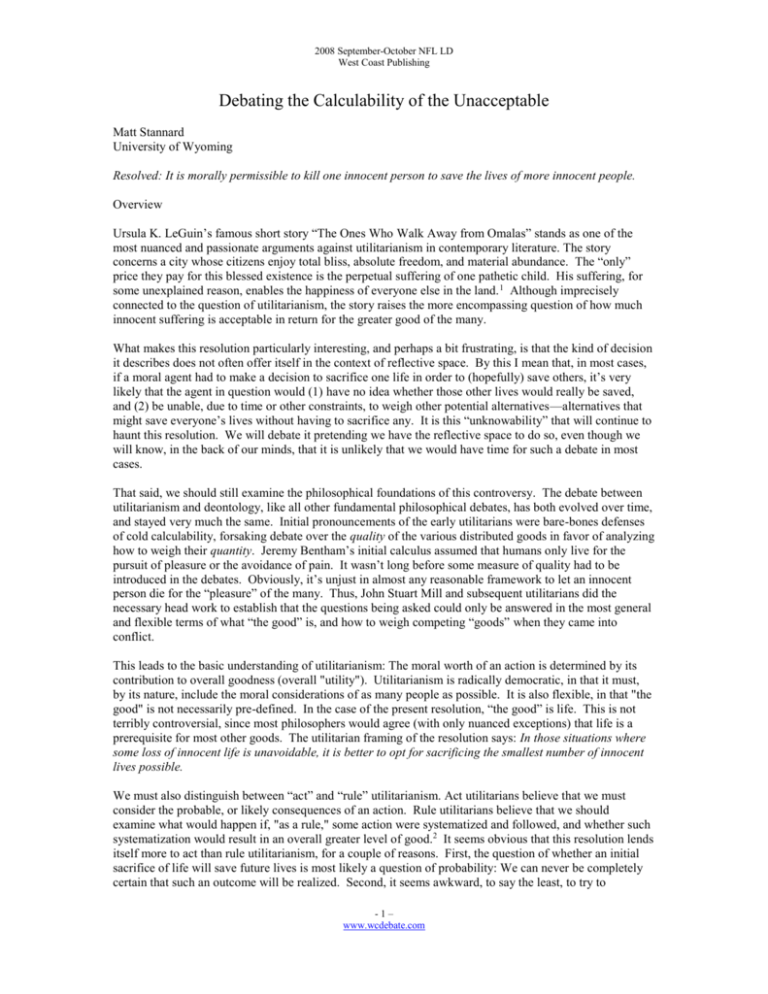
2008 September-October NFL LD West Coast Publishing Debating the Calculability of the Unacceptable Matt Stannard University of Wyoming Resolved: It is morally permissible to kill one innocent person to save the lives of more innocent people. Overview Ursula K. LeGuin’s famous short story “The Ones Who Walk Away from Omalas” stands as one of the most nuanced and passionate arguments against utilitarianism in contemporary literature. The story concerns a city whose citizens enjoy total bliss, absolute freedom, and material abundance. The “only” price they pay for this blessed existence is the perpetual suffering of one pathetic child. His suffering, for some unexplained reason, enables the happiness of everyone else in the land. 1 Although imprecisely connected to the question of utilitarianism, the story raises the more encompassing question of how much innocent suffering is acceptable in return for the greater good of the many. What makes this resolution particularly interesting, and perhaps a bit frustrating, is that the kind of decision it describes does not often offer itself in the context of reflective space. By this I mean that, in most cases, if a moral agent had to make a decision to sacrifice one life in order to (hopefully) save others, it’s very likely that the agent in question would (1) have no idea whether those other lives would really be saved, and (2) be unable, due to time or other constraints, to weigh other potential alternatives—alternatives that might save everyone’s lives without having to sacrifice any. It is this “unknowability” that will continue to haunt this resolution. We will debate it pretending we have the reflective space to do so, even though we will know, in the back of our minds, that it is unlikely that we would have time for such a debate in most cases. That said, we should still examine the philosophical foundations of this controversy. The debate between utilitarianism and deontology, like all other fundamental philosophical debates, has both evolved over time, and stayed very much the same. Initial pronouncements of the early utilitarians were bare-bones defenses of cold calculability, forsaking debate over the quality of the various distributed goods in favor of analyzing how to weigh their quantity. Jeremy Bentham’s initial calculus assumed that humans only live for the pursuit of pleasure or the avoidance of pain. It wasn’t long before some measure of quality had to be introduced in the debates. Obviously, it’s unjust in almost any reasonable framework to let an innocent person die for the “pleasure” of the many. Thus, John Stuart Mill and subsequent utilitarians did the necessary head work to establish that the questions being asked could only be answered in the most general and flexible terms of what “the good” is, and how to weigh competing “goods” when they came into conflict. This leads to the basic understanding of utilitarianism: The moral worth of an action is determined by its contribution to overall goodness (overall "utility"). Utilitarianism is radically democratic, in that it must, by its nature, include the moral considerations of as many people as possible. It is also flexible, in that "the good" is not necessarily pre-defined. In the case of the present resolution, “the good” is life. This is not terribly controversial, since most philosophers would agree (with only nuanced exceptions) that life is a prerequisite for most other goods. The utilitarian framing of the resolution says: In those situations where some loss of innocent life is unavoidable, it is better to opt for sacrificing the smallest number of innocent lives possible. We must also distinguish between “act” and “rule” utilitarianism. Act utilitarians believe that we must consider the probable, or likely consequences of an action. Rule utilitarians believe that we should examine what would happen if, "as a rule," some action were systematized and followed, and whether such systematization would result in an overall greater level of good.2 It seems obvious that this resolution lends itself more to act than rule utilitarianism, for a couple of reasons. First, the question of whether an initial sacrifice of life will save future lives is most likely a question of probability: We can never be completely certain that such an outcome will be realized. Second, it seems awkward, to say the least, to try to -1– www.wcdebate.com 2008 September-October NFL LD West Coast Publishing systematize a rule saying we should sacrifice innocent life in order to save innocent life. Such a situation cannot help but present itself as an exceptional circumstance, which makes it subject to relatively spontaneous decisionmaking. Opposed to utilitarianism, and consequentialism in general, is the “deontological” school of moral thought, which holds that the “moral permissibility” of an action is not found in its outcomes, but rather in the rightness or wrongness of doing it in the first place. The most common version of this theory holds that such rightness or wrongness is a matter of the intent of the moral agent.3 In the three formulations of Kant's categorical imperative, we see three refutations of the notion of killing innocent people to save other innocent people: 1. Act only according to that maxim by which you can also will that it would become a universal law. 2. Act in such a way that you always treat humanity, whether in your own person or in the person of any other, never simply as a means, but always at the same time as an end. 3. Act as though you were, through your maxims, a law-making member of a kingdom of ends. In terms of (1), it is easy to see that, if I universalized the "kill innocent people to save other innocent people" maxim, many, many innocent people would die, frequently as a result of the mere speculation that such an action would save other lives. Each and every innocent person would live in fear of being "chosen" to die to save others. It would be like some kingdom in a mythical fantasy novel where virgins were regularly sacrificed to save the rest of the kingdom from the dragon. In terms of (2), it is clear that if I kill an innocent person in order to save others, I am using that person as a means to an end, rather than treating them as an end in themselves. The logical extension of such an attitude towards a fellow human being would make for a world far worse than the one intended when I set out to save those other innocent people. Once I have conceded the moral permissibility of treating humans as means rather than ends, then I have justified slavery; I have justified executing innocent people in order to keep order. I may even have justified cannibalism. And (3), of course, raises the same question as (1). I would not want to “make a law” that innocent people had to be killed if it were suspected that their death would save others. Such a law would be inappropriate to the complexity of humanity, and to the categorical imperative of benevolent treatment of the innocent. The 20th century, practically from beginning to end, was a kind of “test” of utilitarianism, and in many people’s minds, utilitarianism failed the test. From the cusp of the 19 th and 20th centuries, when the United States was completing its “manifest destiny” of westward expansion, at the expense of the lives of millions of indigenous Americans, to the Nazis’ glorification of the “good” of Germans at the expense of millions of non-Germans, to the “experiment” with totalitarian communism, it seemed as if the calculations involved in sacrificing an unfortunate few for the good of the many always ended up destroying the bodies of the former and the souls of the latter. Europe was left in ruins, and the United States was judged to be a bastion of cynical decadence, incapable of setting a moral example for the world. Technology and human management, lauded in the “progressive” era as solidly utilitarian values, proved incapable of making ethical decisions concerning who to sacrifice and who to save. In fact, the very foundations of calculability were vulnerable to attack; not merely from traditional deontology, but from a strain of critical theory deeply concerned with ethics. There is a direct line of thinking from Kant’s categorical imperative to the stern judgments made by Jean-Paul Sartre that, for example, in the case of the Second World War, we had “the war we deserve.” Utilitarianism came to be seen as “modernist” in a very negative sense. Ethical and political philosophers struggled to find new ways of thinking about ethics that offered a way out of “measuring” morality. One contemporary scholar who has written about the dangerous nature of calculative thought, as applied to ethics and politics, is Michael Dillon. Dillon believes that “weighing” lives against each other is, itself, unethical. It reduces people to units of calculation that can then be subject to further calculation. It strips the sacred respect for life from each individual. Dillon is quite serious about the dangers of doing something like "weighing" one innocent life against many: -2– www.wcdebate.com 2008 September-October NFL LD West Coast Publishing Once rendered calculable, however, units of account are necessarily submissible not only to valuation but also, of course, to devaluation. Devaluation, logically, can extend to the point of counting as nothing. Hence, no mensuration without demensuration either. There is nothing abstract about this: the declension of economies of value leads to the zero point of holocaust. However liberating and emancipating systems of value "rights" may claim to be, for example, they run the risk of counting out the invaluable. Counted out, the invaluable may then lose its purchase on life.4 Like many other deontological authors (including some who are unintentionally Kantian), Dillon believes there is an "unknowability" to the human condition that is missed by utilitarians. This unknowability is one reason why we can't morally commit to the death of one person to save others' lives: We don't really know if those lives will be saved, nor do we know whether there might be some other, less costly way of saving them. Dillon puts it simply: "...the human being is not decided. It is precisely undecidable." Other authors point out that it is wrong to allow a certain evil to happen in order to avoid an uncertain, more evil outcome. Certainty, it is argued, should trump uncertainty. 5 This position dooms the utilitarian, since consequences, especially long-term ones, are almost always uncertain. Utilitarianism, however, continues to reassert itself. One reason utility and consequentialism endure is that they are seen as somewhat inevitable features of human existence. In fact, even deontological theorists constantly “slip into” consequentialism in order to defend their values—they can’t help it. At one point or another, we will find a reason to depart from an absolute moral claim in order to achieve something “better”—it’s just a question of our threshold. As Ingmar Person writes: Suppose that my hair has a unique healing quality: thousands of terminally ill patients could be saved if a couple of strands are removed and made into a medicine. What should the rights theorist say if I none the less refuse to have these strands removed? Surely, something like this: the suffering caused by respecting my right to my strands of hair is so great that we are morally justified in violating the right. But then there is a limit on the weight of my right, on its capacity to restrain maximization; a right provides a moral reason that can be outweighed… this limit would seem to have to be based on consequentialist considerations…Thus, when it comes to the precise weight of rights, no less than their extension, we see that it cannot be fixed unless we transcend the natural rights framework in favour of a consequentialist one.6 In the final analysis (or as much a final analysis as a resolution like this allows), the real beauty of this resolution lays in the aporia it inevitably produces. “Aporia” is the Greek term for "embarrassing puzzlement." It refers to a state of profound philosophical confusion: Not merely "not knowing" something, but being acutely aware of the fundamental unknowability of something. In this case, the arguments for and against utilitarian calculability are, in their own way, equally sound. The idea of killing one innocent person to save others seems utterly unacceptable, and at the same time utterly unavoidable. Debating both sides of this resolution will produce a heightened awareness of the impossibility and inevitability of the myriad hard choices we face in our lives, if our lives are to have any significant meaning at all. -3– www.wcdebate.com 2008 September-October NFL LD West Coast Publishing Case studies that justify the affirmative position: Shooting down the commercial airlines headed into populated buildings and other similar cases. These examples all have to do with impending disasters. The most topical example would be whether a person ought, if they were able, to shoot down a commercial airplane that had been hijacked and was about to fly into a building filled with innocent people. Shooting the airplane down would kill a few terrorists and a couple hundred innocents, but potentially save thousands of innocent people in the skyscraper. Collateral damage when carrying out military strikes against a tyrant. This is another common justification for quick, but sober, utilitarian decisionmaking. Imagine that we had Adolph Hitler holed up in a building in Berlin, and had a chance to bomb that building. We know, with near-certainty, that if he escaped, Hitler would continue to wage aggressive wars and commit genocide against various groups. We also know that there are a few innocent people in the building; perhaps custodians, low-wage workers, perhaps even prisoners. While we would regret the casualties, and try to avoid making too many of them, utilitarianism would nevertheless compel us to strike, and not merely for cold, calculative reasons, but because of the moral compulsion to kill a tyrant before he kills again. Churchill’s Coventry dilemma. This may be one of the more interesting moral dilemmas in history. In November of 1940, the Germans bombed Coventry, England. It has been alleged that Prime Minister Winston Churchill knew the German plan because British intelligence had broken German codes. However, Churchill allegedly let the bombing take place without evacuating the city, because if he had ordered the city cleared out, the Germans would have known the code had been broken and would quickly have invented a new code. The story goes that this unfortunate bluff, which naturally resulted in wide scale death, helped the allies catch the Germans by surprise later on. The end result, beating the Germans in the war, undoubtedly saved millions upon millions of lives. 7 Some possible negative arguments: Unapologetic Deontological Ethics. The foundational idea of deontological ethics is that the rightness or wrongness of an action cannot be determined by its consequences. The reasons for this are several, but perhaps the most compelling reason is an epistemological one, grounded in what it is possible to know, and what it is impossible to know. Mainly, says the deontologist, it is impossible to completely know the consequences of an action. Deontology actually dances circles around utilitarianism on this question. Imagine that my action causes some innocent person to die. According to utilitarianism, that would make the action wrong. Imagine, though, that the innocent person who died would have given birth to a tyrant who would have killed thousands of innocent people. That subsequently makes my action right, according to the utilitarian. However, let’s say that the tyrant would have reformed, and before he died, he would have saved millions of innocent people from a natural disaster. That subsequently makes my action wrong! Obviously this example is ridiculous, but that’s the point according to the epistemology of deontological ethics: Judging the morality of an action by its consequences is ridiculous, because the causal chain goes on forever, and there’s no predicting where it will turn up. If we desire a consistent ethics, then actions cannot be right, then wrong, then right again, then “who knows?” Instead, Kantian deontological morality establishes ones intentions as being the measure of whether an action is ethical or not. Regardless of desirable or undesirable consequences, those consequences do not weigh on the initial judgment of morality. The Dresden Bombings. If Coventry was a dilemma that vindicated Winston Churchill, the bombings of Dresden, Germany by the allies in the final weeks of World War II is the negative counterpart. Somewhere between 24,000 and 40,000 civilians, presumably "innocent" civilians, died in the bombings. The allies claimed that the bombing was necessary because Dresden contained important transportation and communication centers. Others, especially in hindsight, have objected to this justification, claiming that Dresden lacked the requisite military significance to be a justified target of that much bombing. 8 Negatives can argue that affirming the resolution, and consequently accepting the calculus that allows innocent death in order to save “more” lives on down the line, leads to these kinds of decisions. Like the Michael Dillon quote above, once we have accepted that innocent life is “expendable” for some higher purpose, there is no limit to what we will do to that innocent life. -4– www.wcdebate.com 2008 September-October NFL LD West Coast Publishing “Progressive” and creative utilitarianism. At least since the modifications of John Stuart Mill, utilitarians have not been willing to sit idly by and let one innocent life be sacrificed for the lives of other innocents. Instead, just as Mill believed that individuals must progressively achieve their potential in order to maximize human good,9 genuine utilitarians would be determined to create a world where no innocent lives ever had to be sacrificed for the good of anyone else. Instead of seeing utilitarianism as accepting the suffering of 49% in return for the good of 51%, the “progressive” strain of utilitarianism is constantly engaged in a struggle to expand the people (moral beings) included in the overall good. Negatives could argue that “accepting” the resolution entrenches a feeling of fatality, inevitability, and complacency. Instead, they could argue, rejecting the resolution means rejecting the notion that innocent life would ever have to be sacrificed for a greater good. But it is only in rejecting the formula of the resolution, they could argue, that such creativity is unleashed. 1 Ursula K. LeGuin. "The Ones Who Walk Away from Omelas." The Best Science Fiction of the Year #3, 1973. 2 "Utilitarianism." Wikipedia.org. <http://en.wikipedia.org/wiki/Utilitarianism> 3 See Olson, Robert G. 1967. 'Deontological Ethics'. In Paul Edwards (ed.) The Encyclopedia of Philosophy. London: Collier Macmillan: 343. 4 Michael Dillon. "Another Justice." Political Theory, Vol. 27, No. 2, 155-175 (1999). PP. 164-5. 5 See Nicholas Rescher, Risk: A Philosophical Introduction to the Theory of Risk Evaluation and Management. 1983, passim. 6 Ingmar Person, Three Methods of Ethics: A Debate. 1997. pp. 13-14. 7 It should be noted that, while the story itself is a good illustration of the paradoxes of the current resolution, many historians disagree with this account, and some insist that it never happened at all. See Peter J. McIver, "Leading Churchill Myths: 'CHURCHILL LET COVENTRY BURN TO PROTECT HIS SECRET INTELLIGENCE,'" The Churchill Centre, No Date, <http://www.winstonchurchill.org/i4a/pages/index.cfm?pageid=107> 8 Addison, Paul & Crang, Jeremy A. (eds.). Firestorm: The Bombing of Dresden. Pimlico, 2006. 9 Henry Milner. Civic Literacy: How Informed Citizens Make Democracy Work. 2002. p. 147. -5– www.wcdebate.com
